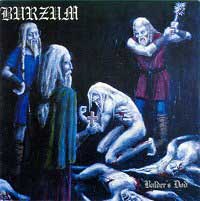Burzum - Dauði Baldrs
Review: An extension of the minimalistic atonal symphonies which layered basic tone progressions over each other in fugues of masterful narrative layout, approaching a more complex ideal of song structure and its influence on the elements of the song, Balder's Dod constrains the pop-like melodic tendencies of the previous Burzum album to classically-inspired ambient looping structures, with less emphasis on overlay and harmonization as on sheer mutation of riff, song, and structure alike.
Often reusing familiar themes from Filosofem, this music manipulates a traveling show of ancient delights in a narrative winding its way through dark emotions best described as harmonizations to a fantasy conceived in a dream. Obscurity reigns in the simple anti-riff patterns that fulfill the demand of a single-note lead for a constantly engaging melodic tension with tone sequences modifying themselves in subtle but structurally significant ways, throwing doubt on the structure and giving it the romantic requisite of dual nature and emotional wanderlust. Where in Plato's cave one saw silhouettes, in Grishnack's castle the light is hidden under shadow.
The repetitive nature of Dauði Baldrs and the frequent lack of percussion instruments makes it a difficult chew for modern listeners, especially those expecting metal music where rhythm and melody are given separate musical voices. However, with their Dead Can Dance-inspired medieval format, these works continue the explorations of early Burzum in ways perhaps more profound than Filosofem, which stagnated into wistful, almost drunkenly poignant pop music; here there is a new austerity of persona in the malevolent and brooding soul of nature restless in the presence of sleeping humanity.

